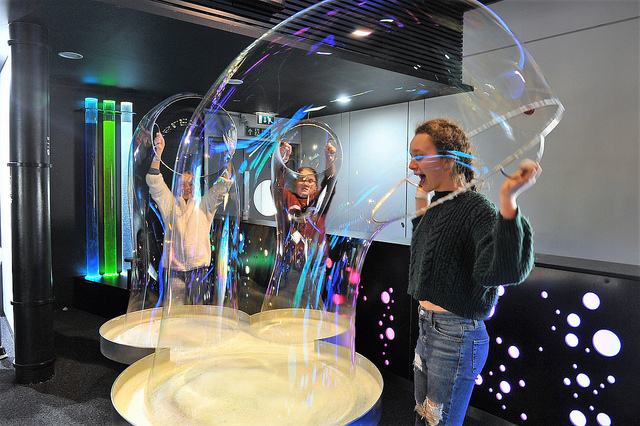
30 Shiphay Lane, Torquay TQ2 7DY
E: admin@tggsacademy.org
T: 01803 613215
Y7-11 Absence Line: 01803 653 750
30 Shiphay Lane, Torquay TQ2 7DY
E: admin@tggsacademy.org T: 01803 613215
Y7-11 Absence Line: 01803 653 750

Physics at TGGS
Current Teaching Staff:
Mr J Castillo - Head of Department
Mrs A Isaaks Mr R Baker , Mrs H Greenaway, Mrs N Leflaive, Mrs J Kittow, Mrs S Faro
Curriculum Intent:
Our Physics intent is to equip our students with the depth of knowledge to be able to fully understand the fundamental principles that govern all energy and matter in our world, from the scale of subatomic particles up to the intergalactic scale of the universe. Our students will gain skills in problem solving, mathematical application, practical work as well as develop the curiosity and confidence to approach any demanding career or higher-level study.
Subject Overview
The subject covers the study of the very little, subatomic particles, to the very large, space. The main two key ideas in the learning of the subject pivot around either a scalar quantity, Energy, or a vector quantity, force. In a nutshell, we teach the classical physics content of this very broad subject.
SMSC
Students in Physics reflect on their beliefs about how the Universe works and through research and experiment their perspectives change.
Through group/practical work students work together respecting each other's different backgrounds and beliefs develop students’ social skills.
Students learn why the use of reliable data is needed to answer scientific questions, and why it may be uncertain, incomplete or not available. They also describe the environmental impact arising from the use of different energy resources.
Students learn to appreciate the power and limitations of science and consider any ethical issues which may arise.
In Physics, students give examples to show that there are hazards associated with science-based technologies which have to be considered alongside the benefits.
Students should be able to apply their knowledge to the uses of radiation and evaluate the best sources of radiation to use in a given situation.
Students should be able to compare the hazards associated with contamination and irradiation. They also learn about how to take suitable precautions to protect against any hazard that the radioactive source used in the process of irradiation may present.
Students learn to evaluate the perceived risks of using nuclear radiations in relation to given data and consequences as well as to evaluate the effect of various factors on thinking distance based on given data.
In lessons, we discuss how the use of new technologies are represented in the media – energy generation.
Students are able to describe and explain specific examples of the technological applications of science. They are also able to describe and evaluate, with the help of data, methods that can be used to tackle problems caused by human impacts on the environment.
British Values
The law and democracy
Many learning opportunities in Physics will be framed by complying with health and safety legislation. This will include the role of risk assessments in defining and addressing risks. Opportunities will arise to discuss British law in this context.
Students will find it necessary to distinguish between opinions based on valid, repeatable and reproducible evidence and opinions based on non-scientific ideas (for example, prejudice or hearsay).
Individual liberty
Students of Physics will have opportunities that will allow them to use their knowledge and understanding to pose scientific questions and define scientific problems. This may include providing evidence from both primary and secondary data and understanding the perspectives of others. The Physics curriculum will also introduce students to the idea that science can’t provide the answers to some questions, for example, where beliefs, opinions and ethics are important.
Students will use their individual liberty to select from the choices to make while they take their current qualification and they will often have choices to make as they consider further education, training or careers after completing the apprenticeship or course
Tolerance and mutual respect
The approaches to solving scientific problems that are part of Physics qualifications require students to show tolerance and mutual respect in relation to: Behaviour in the laboratory and classroom; Creation of an effective working environment whether in a college, ILP or the workplace through tolerance and mutual respect ; Health and safety: implications of clothing and other items of religious significance; Understanding of the influence of different faiths and beliefs in some decisions which impact on science and healthcare
Challenging extremism
The Prevent duty is not intended to stop students or apprentices debating controversial ideas. If students or apprentices make comments that could be regarded as extremist, staff should encourage the students to consider what they have said, where the views they are expressing came from, whether the evidence they have is accurate and full, whether they have received a partial or incorrect interpretation of evidence, alternative interpretations and views, whether they need to make a referral to the designated safeguarding lead.
If staff do not feel confident in challenging extremist ideas with their students, they should ask for support.
If students behave in a way that contravenes the equality and diversity aspects of the code of conduct at TGGS, then this is a disciplinary issue, e.g., refusing to work with a gay student or apprentice or a student or apprentice of a different ethnicity.
Reading
Up to the end of GCSE years, reading includes the study of textbooks that contain new ideas and values, unfamiliar vocabulary and syntax. There is a systematic study of word meaning, and students are guided to react to texts through discussions, answering questions, generating questions and writing, for example. Physics students are provided with a learning grid booklet for each unit as well as online resources, including an electronic textbook.
From year 12 onwards, the students are using two different textbooks (one is a physical book and the other one is on online textbook from a different publisher), together with other alternative resources to stretch their understanding of the subject, such as Isaac Physics, for example. There is also the possibility to extend their reading by using scientific magazines, such as “Physics World” or “Ingenia”, for example.
Oracy
To get our classrooms talking then, we implement several strategies, such as:
- Questioning that requires to “think” by getting the students to clarify, probe and/or recommend. Depth is required from their responses.
- Allowing thinking time for students to formulate thoughts.
- Pupil-led feedback and critiques to peer assess, but also to encourage constructive talk.
Careers
Physics teaching makes connections between the subject and future careers by highlighting the relevance of Physics for different careers, for example.
Our department uses posters and displays in classrooms or corridors listing careers that the subject could lead onto.
There are also included in the introductory lessons to new units in the lower years as well as in our learning grids booklets for GCSE units.
Occasionally we visit specific work places, such as Torbay hospital, local engineering companies and trips to visit Physics related sites, such as CERN, for example.
Character skills
Students have many opportunities to develop leadership and team work skills throughout the key stages through the practical application of Physics. There are also opportunities to become Physics Ambassadors; British Science week as well as representing the school in competitions, such as the BPhO Physic Olympiad, and Open evenings. In lessons, students are challenged and are encouraged to demonstrate resilience and determination when approaching the problem solving aspects of Physics. They are given opportunities to investigate concepts with independence and creativity which gives them a sense of achievement and pride in their work. Our approach to teaching and learning results in a fun, engaging and high quality Physics education that provides students with the foundations and knowledge for understanding the world. Through our teaching and extra-curricular opportunities students gain the understanding that Physics has, and continues to change our lives, and that it is vital to the world’s future prosperity.









